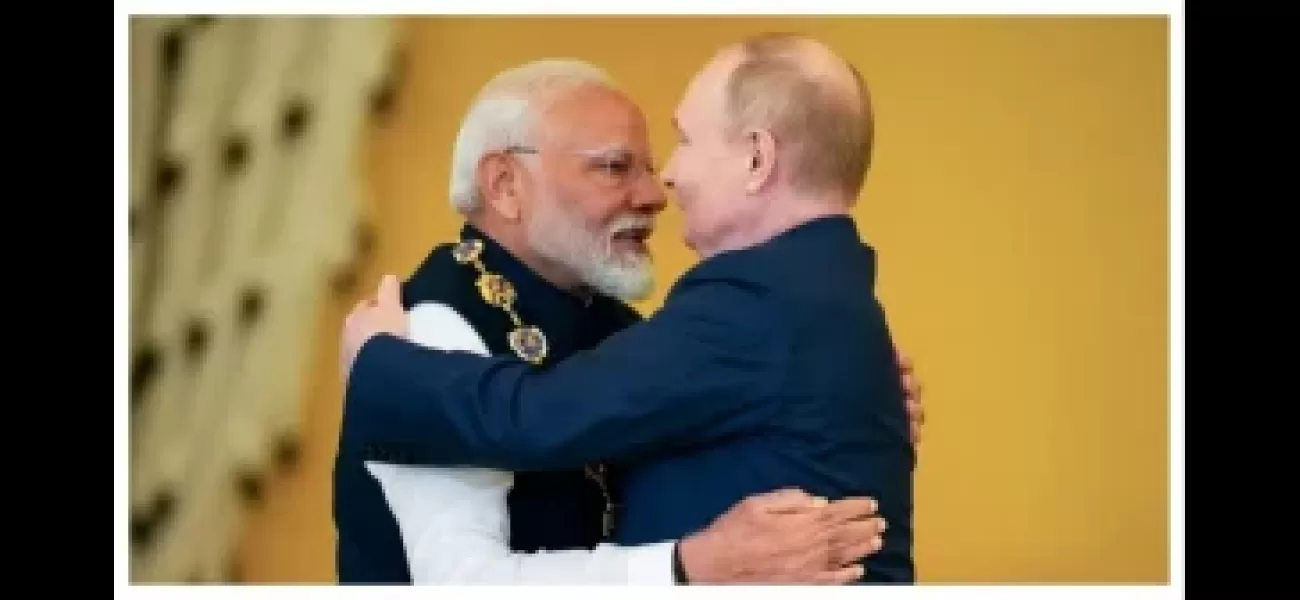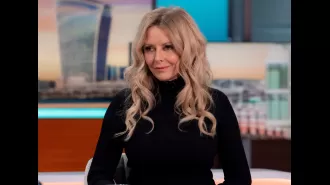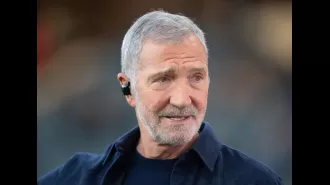Russian President Vladimir Putin and Indian Prime Minister Narendra Modi embraced during a meeting in Russia.
PM Modi's visit to Russia aligns with the NATO summit in Washington, providing a chance for Putin and Modi to advance their shared geopolitical goals.
July 9th 2024.

Prime Minister Narendra Modi embarked on a two-day visit to Russia, coinciding with the NATO summit in Washington on July 9th. This presents a valuable opportunity for both Russian President Vladimir Putin and Prime Minister Modi to further their mutual geopolitical interests. Putin is eager to dispel the notion that he is isolated, as portrayed by the US-led West. On the other hand, Modi is concerned about Moscow's increasing reliance on China for military and material aid. It is imperative for India to sway Putin towards their side, especially in light of the tense relationship with China and their denial of aggression and occupation of Indian territories.
The welcoming gesture extended by Putin to Modi in Moscow was warm and cordial. They shared a cup of tea, berries, and sweets, and went on a tour of Putin's Dacha in the suburbs of Moscow, riding in a motorized cart. Modi, in turn, posted pictures of his arrival on social media, in both Russian and English, expressing his enthusiasm for deepening the Special and Privileged Strategic Partnership between the two nations.
While the optics may seem favorable for India, Putin's recent visit to North Korea and his camaraderie with Kim have not gone unnoticed by the international community. India has maintained a stance of neutrality in the Russia-Ukraine conflict, neither condemning nor defending the Russian invasion, but emphasizing the need for a diplomatic resolution. However, this approach has resulted in India distancing itself from the Western public. Governments may prioritize short-term benefits, but ultimately, public opinion prevails. India's ambiguous stance has only benefited a few Indian businesses dealing with petroleum imports, while Russia has been able to circumvent the severe sanctions imposed by the West. India has not gained anything from this arrangement.
The US is not pleased with India's close relationship with Russia, and at the time of Modi's meeting with Putin, the State Department expressed concerns about India's proximity to Russia during their invasion of Ukraine. The image of Modi embracing Putin also drew criticism from Ukraine President Zelenskyy, who viewed it as a "huge disappointment and a devastating blow to peace efforts." He shared photos of the destruction and casualties caused by Russian rockets on social media, which occurred just hours before Modi's arrival in Moscow.
The US has made it clear to India that any resolution of the Ukraine conflict must adhere to the principles of the UN Charter, respect Ukraine's territorial integrity and sovereignty. While India and Russia have had a strong alliance dating back to the Cold War, the current global landscape has changed significantly. It is crucial for those in charge of India's foreign policy to recognize the uniqueness of our democracy, economy, and history in Asia and the world. Unfortunately, there are doubts about whether anyone in the establishment has the capability to understand these intricacies, let alone devise and implement a bipartisan strategy. India may continue to navigate its way through the global arena, content with being in the middle and merely making appearances at the G20. However, as we face challenges such as cybercrime in Cambodia, labor issues in Israel, and immigration attempts worldwide, we may be squandering our demographic dividend while trying to showcase the Indian diaspora, who abandoned the country when it needed them the most.
The welcoming gesture extended by Putin to Modi in Moscow was warm and cordial. They shared a cup of tea, berries, and sweets, and went on a tour of Putin's Dacha in the suburbs of Moscow, riding in a motorized cart. Modi, in turn, posted pictures of his arrival on social media, in both Russian and English, expressing his enthusiasm for deepening the Special and Privileged Strategic Partnership between the two nations.
While the optics may seem favorable for India, Putin's recent visit to North Korea and his camaraderie with Kim have not gone unnoticed by the international community. India has maintained a stance of neutrality in the Russia-Ukraine conflict, neither condemning nor defending the Russian invasion, but emphasizing the need for a diplomatic resolution. However, this approach has resulted in India distancing itself from the Western public. Governments may prioritize short-term benefits, but ultimately, public opinion prevails. India's ambiguous stance has only benefited a few Indian businesses dealing with petroleum imports, while Russia has been able to circumvent the severe sanctions imposed by the West. India has not gained anything from this arrangement.
The US is not pleased with India's close relationship with Russia, and at the time of Modi's meeting with Putin, the State Department expressed concerns about India's proximity to Russia during their invasion of Ukraine. The image of Modi embracing Putin also drew criticism from Ukraine President Zelenskyy, who viewed it as a "huge disappointment and a devastating blow to peace efforts." He shared photos of the destruction and casualties caused by Russian rockets on social media, which occurred just hours before Modi's arrival in Moscow.
The US has made it clear to India that any resolution of the Ukraine conflict must adhere to the principles of the UN Charter, respect Ukraine's territorial integrity and sovereignty. While India and Russia have had a strong alliance dating back to the Cold War, the current global landscape has changed significantly. It is crucial for those in charge of India's foreign policy to recognize the uniqueness of our democracy, economy, and history in Asia and the world. Unfortunately, there are doubts about whether anyone in the establishment has the capability to understand these intricacies, let alone devise and implement a bipartisan strategy. India may continue to navigate its way through the global arena, content with being in the middle and merely making appearances at the G20. However, as we face challenges such as cybercrime in Cambodia, labor issues in Israel, and immigration attempts worldwide, we may be squandering our demographic dividend while trying to showcase the Indian diaspora, who abandoned the country when it needed them the most.
[This article has been trending online recently and has been generated with AI. Your feed is customized.]
[Generative AI is experimental.]
0
0
Submit Comment





